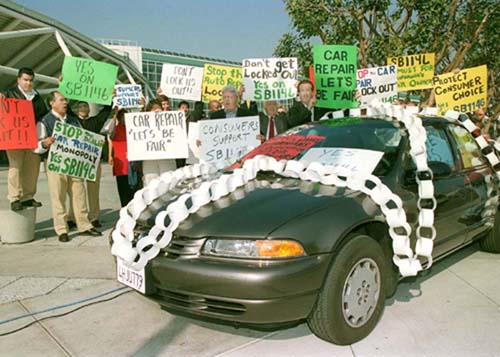|
OBD II
Legislation Stirs up Conflict in
California

In a massive show of protest against
anti-competitive practices by car companies and their
franchised dealers, consumer groups, small business
owners, and trade associations rallied at the Los
Angeles Auto Show on Jan. 10. Activists distributed
fliers urging show attendees to support SB 1146, state
legislation that would ensure access to on-board
diagnostics (OBD) II standards for independent service
providers and parts manufacturers.
Featuring a team of tow trucks
circling the area with disabled cars in tow, and a
vehicle wrapped in chains, protestors wanted to make a
powerful statement about what will happen should the
current California OBD II rules remain unchallenged.
"AAIA hopes that the demonstration will send a strong
signal to the state legislature that California car
owners want a choice in where they obtain service for
their vehicle," said Aaron Lowe, vice president of
government affairs at the Automotive Aftermarket
Industry Association (AAIA). Howard Owens, executive
director, Consumer Federation of California, mirrored
Lowe's sentiment. "It's time to put California
consumers, not car makers, back in the driver's seat of
their own cars," Owens said.
OBD II systems have been a
standard feature on new cars and trucks since 1996. The
systems control all emissions-related parts and
components. Each manufacturer calibrates their OBD II
systems differently, sometimes even using different
codes for different models. Thus, the research and
development involved in reverse-engineering parts that
are compatible with the computer software could take
years, and put many independent parts manufacturers out
of business. More than 57,000 jobs are at stake, and
consumers will be faced with a $17 billion increase in
maintenance costs over the next ten years if the car
companies succeed in blocking access to the OBD II
codes.
"When 70 percent of consumers
choose to go to independent repair shops after their
warranties expire, that sends a strong message that we
need to preserve competition in car repairs," stated
Rosemary Shahan, president of Consumers for Auto
Reliability & Safety (CARS). CARS is a member of the
California Consumer Choice Coalition, a consumer
advocacy group in which AAIA plays a lead role.
"While there is strong dealer
opposition to this legislation, I am optimistic of our
chances to obtain enactment of this bill if the
aftermarket industry in California continues to make
their voices heard," Lowe said. "I am also hopeful
because of the strong support we have received from
state aftermarket groups, the auto clubs of northern and
southern California, and the enthusiastic backing of
consumer groups."
Senate bill 1146, authored by Sen.
John Burton, D-San Francisco, ensures access to the
information and tools necessary to provide service and
develop compatible parts for OBD II systems. The bill
recognizes the needs of auto manufacturers to protect
legitimate proprietary and trade secret information. The
California Air Resources Board is slated to act as a
neutral third-party in determining which information is
necessary to disclose. SB 1146 also allows vehicle
manufacturers to obtain fair and reasonable compensation
from aftermarket companies for the cost of providing the
required information.
SB 1146 passed by a large margin
(34-6) in the California State Senate, and enjoyed
bi-partisan support. The bill must now go before the
state Assembly, where it will be subject to another
round of review and discussion. California Consumer
Choice is collecting petitions across the state, and
urging constituents to contact state lawmakers as well
as California Governor Cray Davis to show support for SB
1146.
"Since California's emissions
standards are among the most stringent in the U.S., the
Environmental Protection Agency tends to adopt their
regulations into federal policy. Thus, the California
decision could have a sweeping impact on the entire
aftermarket industry," Lowe said.
"Regulations that ensure
properly-functioning vehicle emissions systems are
important to California's efforts to achieve better air
quality-a goal we all support-but the problem is in the
fine print. The Consumer Choice Bill, SB 1146, is aimed
specifically at reforming the provisions in OBD rules
that are anti-competitive, anti-consumer and
anti-environment," said Jim O'Neill, owner of Chino Auto
Tech, an independent full-service repair
shop.
By refusing to make critical
computer interface codes available to the aftermarket
industry, auto manufacturers are creating a monopoly on
the repair and maintenance of most vehicles on the road
today. Trade associations, consumer groups and
independent auto parts and service providers need to
support open OBD II standards.
For more information about OBD II,
visit the California Consumer Choice Web site at http://www.cccauto.org/obd.htm.
Click
here for other Online Stories
|